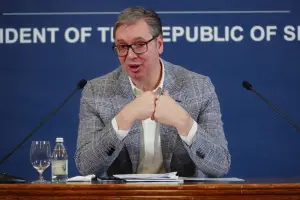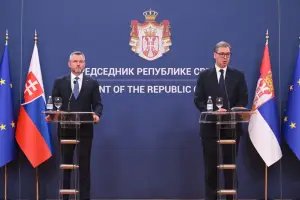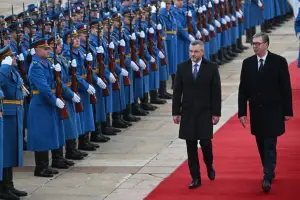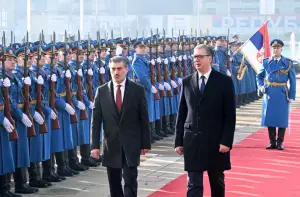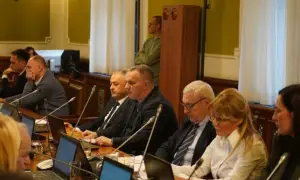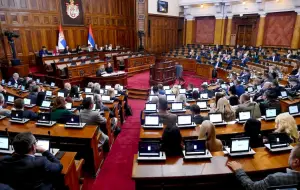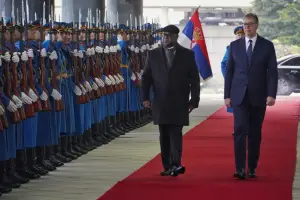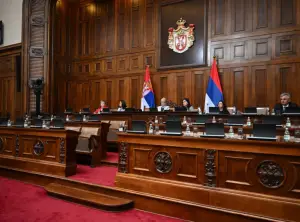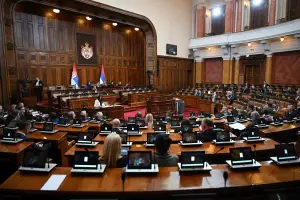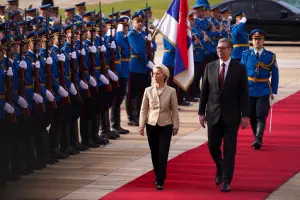Q:
A:
Prime Minister Kostunica pledges regional cooperation, EU integration
Belgrade,
19 October 2004
Serbian Prime Minister Vojislav Kostunica addressed the parliament today to expound on his proposal that lawmakers appoint Predrag Bubalo as the Minister of Economy, Milan Parivodic as the Minister of International Economic Relations and Slobodan Vuksanovic as the Minister of Education and Sport.
The following is the Prime Minister's address in full:
Ladies and gentleman,
The appointment of three ministers provides me with a good opportunity to address the parliament that empowered me to run the government nearly eight months ago. I call it a good opportunity because the issue here is a proposal to appoint ministers in three important sectors. The proposal reflects the government's readiness to undergo changes and strengthen its team in order to improve results. I will start this address by reiterating that general stability in Serbia, that is the setting up of a system of norms and institutions in order to secure stabile economic, political and social conditions in the country, was the main goal of the government over the past eight months.
The country saw a number of experiments in the past. This government has opted to build deep foundations and strong institutions. Our goal is to build a better house for all present and future generations. We have set out several stages we must go through on the path to our goal which is a stable, democratic and law-abiding Serbia, a Serbia that has a market economy, lives in peace and cooperation with its neighbours and heads resolutely towards regional cooperation and European Union integration, a Serbia that accomplishes its goals in a strong union with Montenegro. However, goals and means are inseparable in politics and I want to enlist ways in which these goals can be achieved.
The first way is the establishment of clear and strong legal rules that will pave the way for internal stability and speed up EU integration efforts. I would like to reiterate that the pro-European government has so far initiated the adoption of over 50 laws and that a further 20 important bills have been prepared. However, since legislation calls for a strong state administration and an independent judiciary, the government has launched thorough reforms in the two sectors as well. The government is due to adopt a strategy for state administration reform; it has endorsed bills on the government and public agencies, and will prepare bills on state administration and civil servants. The bulk of judiciary-related bills have been discussed and improved through parliament debates.
We want the legislative activity to pave the way for concrete results in the economy and benefit citizens. A significant economic revival, particularly in industrial production, agriculture, construction and telecommunications, marked macroeconomic developments in the first eight months of the year. Industrial production grew 6.9 percent against the same period of 2003. GDP growth this year is expected to reach eight percent. The first eight months of the year also saw a $4.5 billion foreign trade deficit whose reduction is among the government's priorities in the forthcoming period. The economy grew at a higher-than-expected rate and prices went up more than planned, with the inflation rate standing at 9.2 percent in the first nine months of the year. The exchange rate of the national currency followed the same trend.
This was mainly due to hikes in global prices of oil and metals which added nearly three percent to the inflation rate increase. The price increase in May-July called for restrictive measures in both fiscal and monetary policies. Industrial production continued to grow in the second and the start of the third quarter largely due to political stability, successful talks with the International Monetary Fund and the write-off of $1.7 billion or 62 percent of the country's debt to the London Club.
The adoption of a new constitution is our next target and another way to improve stability in the country. As you all know, the government has proposed a draft constitution in a bid to find a compromising solution that would be acceptable for all parties in the parliament. The ruling coalition is ready for more compromises in the forthcoming period because Serbia must speed up its efforts to pass the constitution, which is also necessary for full reforms.
The next strategic goal is the resolution of the problem in Kosovo-Metohija. After the March pogrom over Serbs, which at that moment was Serbia's despair and the worry of whole society, the Serbian government prepared a Plan for the resolution of the Kosovo problem. The Plan was unanimously adopted by the Serbian parliament. The Plan proposes a kind of self-government for Serbs in Kosovo-Metohija, who are dispersed throughout the province, somewhat more in the northern part. That self-government should gather them all and give them necessary institutional guarantees through a model of territorial autonomy.
After that, an abundant diplomatic activity of the government followed, which moved the "sleeping giant", the international community, from deadlock. The government's Plan was accepted as equal groundwork for further talks on decentralisation. On one side there is the government's Plan, and on the other UNMIK's plan, i.e. a framework of the reform of local self-government in Kosovo-Metohija. However, the government was not satisfied with this general acceptance of the very fact that apart from UNMIK's plan, there is also one made by the Serbian government. Therefore, it maintains that what has been achieved so far is not a sufficient groundwork for Serbs to go the Kosovo parliamentary election, scheduled for October 23.
We are positive that after five years of collective violence over Serbs, they must receive guarantees of their own self-government so that they could later on be included in Kosovo's institutions of self-government, and not be deceived and cheated once more.
The government is sure that with coalesced state politics, like it was until recently, this goal could be achieved. Unfortunately, I must conclude that such coalesced politics have been impaired, but still, the government resolutely continues to conduct its policy defined by the Plan, unanimously adopted by the parliament.
The other important strategy that this government conducted and which is fully supported by both the parliament and society is orientation towards European integrations. After the third annual report of the European Commission on Serbia-Montenegro's progress in the process of stabilisation and association, which was issued early this year and was generally unfavourable, and after numerous talks with European Union leaders, the Serbian government accepted a proposal of the Commission that this process should continue in the direction of concluding one stabilisation and association agreement, but with two different annexes that will refer to economic, trade and sector policies of the two member states. That cleared us a path for the drafting of the Feasibility Study and preparations for the conclusion of the agreement. That brings two important advantages to Serbia. First, the economic part of the negotiations has been unblocked, and the second, that such a plan does not jeopardise the state union, at least not from Serbia's part, which will continue to insist on integrations, and not disintegrations. I also want to remind you of the national strategy for Serbia-Montenegro's accession to the European Union, which, as an extensive, detailed and regulatory document, will be completed by the end of the year.
These are the main fields of the government's activity and I can freely say that with all the results achieved in the previous months, the building of the rule of law and solid institutions in Serbia is slowly drawing to an end. I am positive that the government paved a good way for less than eight months. In the everyday race with time, due to many problems and conflict situations, people often fail to see something that has been done in a relatively short time and with great efforts.
Now I want to propose to you the candidates for ministers in the Serbian government. I want to propose Slobodan Vuksanovic as a new minister of education and sport. The Serbian government pays special attention to education and sport, because they are very important segments of society. The Ministry of Education and Sport has so far proposed a number of important laws. One of them has been adopted - the Law on amendments to the Law on education. The other law was prepared by the government, and that is a law on anti-doping control. The preparation of a series of important laws is currently underway, such as the law on higher education, law on textbooks, law on elementary and secondary school. All of them will be presented to the parliament by the end of the year. A sport development council has been set up, which includes the most important sport figures, and has begun with the preparation of a national strategy for development of sport. All institutional reforms that I have mentioned should secure a general framework without which our educational system cannot be improved.
Economic reforms which lead to the reviving of the economy are necessary for development and changes in the educational system, since the modern educational system requires massive funding. Speaking about this sector, it is also important that the Serbian parliament appoint a national educational council as soon as possible. It shall be an independent professional body made up of representatives of all relevant institutions, educational and pedagogical, which will determine the direction of further development of our education system, in line with the national educational tradition and general standards of the European Union.
I want to voice great satisfaction with the work of the Ministry of International Economic Relations, which was headed by Minister Predrag Bubalo. I will use this occasion to mention some of their most important results. At the initiative of Minister Bubalo, the organisational structure of the Ministry was changed, by adding two new sectors to the existing ones - the Sector for foreign investment and the Sector for concessions. The foreign investment sector is the pillar of activities related to foreign investment policy and its promotion. By choosing the right activities for attracting foreign investment and the restructuring of the Serbian economy, which is one of the government's top priorities, serious progress was made in the realisation of this goal. A highly qualified team was set up to deal with attracting foreign investment, and it also deals with the preparation of the action plan for eliminating administrative obstacles to foreign investment. The Ministry for International Economic Relations has completed several very important tasks and improved Serbia's bilateral economic relations with certain countries. In that respect, I stress that the continuation of the work of the Business Council with Germany, after the stoppage that came about when the ministries were taken over, which is of considerable importance for the future development of our economic relations with Germany. We had a similar problem in the field of economic cooperation with Italy, that was considerably blocked with the disputes of Italian Fiat and our Zastava, i.e., Duferco and Sartid. We found the best solution, both for us and Italy, and as a result of that, Fiat wrote off an important sum of debt to Zastava, which provided much better prospects for our factory. In the current of those good reactions of Italian businesspeople and business community, a visit by a delegation with the largest number of businesspeople followed.
The Ministry of International Economic Relations actively worked and was involved in negotiations about regulation of the Russian and Chinese debt. That ministry was permanently engaged in a serious restructuring process of Serbian economy and its branches, for which we estimated that are export-oriented. The last example is passing the Decree on production cooperation. I use this occasion to express my gratitude to Minister Bubalo for his work so far as head of the Ministry of International Economic Relations, and I propose Doctor Milan Parivodic as the new minister.
Since May this year, Minister Bubalo has done the job of coordinator in the Ministry of Economy, and that is why I would like to mention some of the most significant results achieved in this ministry.
Instead of last year’s stagnant growth, according to this year’s economic flow in the first nine months, a production growth exceeding 6 percent is expected this year, which is above regional average. During the mandate of this government, the parliament has adopted several important systemic laws prepared by the Ministry of Economy, namely Law on registration of economic subjects, Law on Business Register Agency, Law on bankruptcy procedure, and Law on Agency for licensing bankruptcy managers. A draft law on corporations has been prepared, while drafting the acts amending the existing privatisation laws is in the final phase. The laws to be amended are Law on privatisation, Law on Share Fund and Law on Privatisation Agency. Thanks to adopted legal regulations, conditions for the start of economic activities will be created.
In the first months of 2004, the privatisation process included 155 companies, €76.6 million was collected, €72.2 million was provided for investment and another €2.6 for the social programme. Activities concerning the financial and organisational restructuring of 67 large public companies were accelerated. The Development Fund approves favourable loans to small and medium-sized enterprises and entrepreneurs, while 3.5 billion dinars in loans were approved for 350 long-term investment programmes only this year. The implementation of these programmes will open up more than 5,000 new jobs. Funds for 54 programmes for underdeveloped municipalities were approved for their accelerated development as well as for 47 programmes for devastated municipalities. I am sure that the listed results for both ministries that Predrag Bubalo achieved together with his team are the best recommendation for his appointment as the new economy minister.
Therefore, ladies and gentlemen deputies, in the end, I suggest the National Assembly of the Republic of Serbia to appoint Slobodan Vuksanovic as new Minister of Education and Sport, Milan Parivodic as new Minister of International Economic Relations and Predrag Bubalo as new Minister of Economy and Privatisation.
Thank you.
Ladies and gentleman,
The appointment of three ministers provides me with a good opportunity to address the parliament that empowered me to run the government nearly eight months ago. I call it a good opportunity because the issue here is a proposal to appoint ministers in three important sectors. The proposal reflects the government's readiness to undergo changes and strengthen its team in order to improve results. I will start this address by reiterating that general stability in Serbia, that is the setting up of a system of norms and institutions in order to secure stabile economic, political and social conditions in the country, was the main goal of the government over the past eight months.
The country saw a number of experiments in the past. This government has opted to build deep foundations and strong institutions. Our goal is to build a better house for all present and future generations. We have set out several stages we must go through on the path to our goal which is a stable, democratic and law-abiding Serbia, a Serbia that has a market economy, lives in peace and cooperation with its neighbours and heads resolutely towards regional cooperation and European Union integration, a Serbia that accomplishes its goals in a strong union with Montenegro. However, goals and means are inseparable in politics and I want to enlist ways in which these goals can be achieved.
The first way is the establishment of clear and strong legal rules that will pave the way for internal stability and speed up EU integration efforts. I would like to reiterate that the pro-European government has so far initiated the adoption of over 50 laws and that a further 20 important bills have been prepared. However, since legislation calls for a strong state administration and an independent judiciary, the government has launched thorough reforms in the two sectors as well. The government is due to adopt a strategy for state administration reform; it has endorsed bills on the government and public agencies, and will prepare bills on state administration and civil servants. The bulk of judiciary-related bills have been discussed and improved through parliament debates.
We want the legislative activity to pave the way for concrete results in the economy and benefit citizens. A significant economic revival, particularly in industrial production, agriculture, construction and telecommunications, marked macroeconomic developments in the first eight months of the year. Industrial production grew 6.9 percent against the same period of 2003. GDP growth this year is expected to reach eight percent. The first eight months of the year also saw a $4.5 billion foreign trade deficit whose reduction is among the government's priorities in the forthcoming period. The economy grew at a higher-than-expected rate and prices went up more than planned, with the inflation rate standing at 9.2 percent in the first nine months of the year. The exchange rate of the national currency followed the same trend.
This was mainly due to hikes in global prices of oil and metals which added nearly three percent to the inflation rate increase. The price increase in May-July called for restrictive measures in both fiscal and monetary policies. Industrial production continued to grow in the second and the start of the third quarter largely due to political stability, successful talks with the International Monetary Fund and the write-off of $1.7 billion or 62 percent of the country's debt to the London Club.
The adoption of a new constitution is our next target and another way to improve stability in the country. As you all know, the government has proposed a draft constitution in a bid to find a compromising solution that would be acceptable for all parties in the parliament. The ruling coalition is ready for more compromises in the forthcoming period because Serbia must speed up its efforts to pass the constitution, which is also necessary for full reforms.
The next strategic goal is the resolution of the problem in Kosovo-Metohija. After the March pogrom over Serbs, which at that moment was Serbia's despair and the worry of whole society, the Serbian government prepared a Plan for the resolution of the Kosovo problem. The Plan was unanimously adopted by the Serbian parliament. The Plan proposes a kind of self-government for Serbs in Kosovo-Metohija, who are dispersed throughout the province, somewhat more in the northern part. That self-government should gather them all and give them necessary institutional guarantees through a model of territorial autonomy.
After that, an abundant diplomatic activity of the government followed, which moved the "sleeping giant", the international community, from deadlock. The government's Plan was accepted as equal groundwork for further talks on decentralisation. On one side there is the government's Plan, and on the other UNMIK's plan, i.e. a framework of the reform of local self-government in Kosovo-Metohija. However, the government was not satisfied with this general acceptance of the very fact that apart from UNMIK's plan, there is also one made by the Serbian government. Therefore, it maintains that what has been achieved so far is not a sufficient groundwork for Serbs to go the Kosovo parliamentary election, scheduled for October 23.
We are positive that after five years of collective violence over Serbs, they must receive guarantees of their own self-government so that they could later on be included in Kosovo's institutions of self-government, and not be deceived and cheated once more.
The government is sure that with coalesced state politics, like it was until recently, this goal could be achieved. Unfortunately, I must conclude that such coalesced politics have been impaired, but still, the government resolutely continues to conduct its policy defined by the Plan, unanimously adopted by the parliament.
The other important strategy that this government conducted and which is fully supported by both the parliament and society is orientation towards European integrations. After the third annual report of the European Commission on Serbia-Montenegro's progress in the process of stabilisation and association, which was issued early this year and was generally unfavourable, and after numerous talks with European Union leaders, the Serbian government accepted a proposal of the Commission that this process should continue in the direction of concluding one stabilisation and association agreement, but with two different annexes that will refer to economic, trade and sector policies of the two member states. That cleared us a path for the drafting of the Feasibility Study and preparations for the conclusion of the agreement. That brings two important advantages to Serbia. First, the economic part of the negotiations has been unblocked, and the second, that such a plan does not jeopardise the state union, at least not from Serbia's part, which will continue to insist on integrations, and not disintegrations. I also want to remind you of the national strategy for Serbia-Montenegro's accession to the European Union, which, as an extensive, detailed and regulatory document, will be completed by the end of the year.
These are the main fields of the government's activity and I can freely say that with all the results achieved in the previous months, the building of the rule of law and solid institutions in Serbia is slowly drawing to an end. I am positive that the government paved a good way for less than eight months. In the everyday race with time, due to many problems and conflict situations, people often fail to see something that has been done in a relatively short time and with great efforts.
Now I want to propose to you the candidates for ministers in the Serbian government. I want to propose Slobodan Vuksanovic as a new minister of education and sport. The Serbian government pays special attention to education and sport, because they are very important segments of society. The Ministry of Education and Sport has so far proposed a number of important laws. One of them has been adopted - the Law on amendments to the Law on education. The other law was prepared by the government, and that is a law on anti-doping control. The preparation of a series of important laws is currently underway, such as the law on higher education, law on textbooks, law on elementary and secondary school. All of them will be presented to the parliament by the end of the year. A sport development council has been set up, which includes the most important sport figures, and has begun with the preparation of a national strategy for development of sport. All institutional reforms that I have mentioned should secure a general framework without which our educational system cannot be improved.
Economic reforms which lead to the reviving of the economy are necessary for development and changes in the educational system, since the modern educational system requires massive funding. Speaking about this sector, it is also important that the Serbian parliament appoint a national educational council as soon as possible. It shall be an independent professional body made up of representatives of all relevant institutions, educational and pedagogical, which will determine the direction of further development of our education system, in line with the national educational tradition and general standards of the European Union.
I want to voice great satisfaction with the work of the Ministry of International Economic Relations, which was headed by Minister Predrag Bubalo. I will use this occasion to mention some of their most important results. At the initiative of Minister Bubalo, the organisational structure of the Ministry was changed, by adding two new sectors to the existing ones - the Sector for foreign investment and the Sector for concessions. The foreign investment sector is the pillar of activities related to foreign investment policy and its promotion. By choosing the right activities for attracting foreign investment and the restructuring of the Serbian economy, which is one of the government's top priorities, serious progress was made in the realisation of this goal. A highly qualified team was set up to deal with attracting foreign investment, and it also deals with the preparation of the action plan for eliminating administrative obstacles to foreign investment. The Ministry for International Economic Relations has completed several very important tasks and improved Serbia's bilateral economic relations with certain countries. In that respect, I stress that the continuation of the work of the Business Council with Germany, after the stoppage that came about when the ministries were taken over, which is of considerable importance for the future development of our economic relations with Germany. We had a similar problem in the field of economic cooperation with Italy, that was considerably blocked with the disputes of Italian Fiat and our Zastava, i.e., Duferco and Sartid. We found the best solution, both for us and Italy, and as a result of that, Fiat wrote off an important sum of debt to Zastava, which provided much better prospects for our factory. In the current of those good reactions of Italian businesspeople and business community, a visit by a delegation with the largest number of businesspeople followed.
The Ministry of International Economic Relations actively worked and was involved in negotiations about regulation of the Russian and Chinese debt. That ministry was permanently engaged in a serious restructuring process of Serbian economy and its branches, for which we estimated that are export-oriented. The last example is passing the Decree on production cooperation. I use this occasion to express my gratitude to Minister Bubalo for his work so far as head of the Ministry of International Economic Relations, and I propose Doctor Milan Parivodic as the new minister.
Since May this year, Minister Bubalo has done the job of coordinator in the Ministry of Economy, and that is why I would like to mention some of the most significant results achieved in this ministry.
Instead of last year’s stagnant growth, according to this year’s economic flow in the first nine months, a production growth exceeding 6 percent is expected this year, which is above regional average. During the mandate of this government, the parliament has adopted several important systemic laws prepared by the Ministry of Economy, namely Law on registration of economic subjects, Law on Business Register Agency, Law on bankruptcy procedure, and Law on Agency for licensing bankruptcy managers. A draft law on corporations has been prepared, while drafting the acts amending the existing privatisation laws is in the final phase. The laws to be amended are Law on privatisation, Law on Share Fund and Law on Privatisation Agency. Thanks to adopted legal regulations, conditions for the start of economic activities will be created.
In the first months of 2004, the privatisation process included 155 companies, €76.6 million was collected, €72.2 million was provided for investment and another €2.6 for the social programme. Activities concerning the financial and organisational restructuring of 67 large public companies were accelerated. The Development Fund approves favourable loans to small and medium-sized enterprises and entrepreneurs, while 3.5 billion dinars in loans were approved for 350 long-term investment programmes only this year. The implementation of these programmes will open up more than 5,000 new jobs. Funds for 54 programmes for underdeveloped municipalities were approved for their accelerated development as well as for 47 programmes for devastated municipalities. I am sure that the listed results for both ministries that Predrag Bubalo achieved together with his team are the best recommendation for his appointment as the new economy minister.
Therefore, ladies and gentlemen deputies, in the end, I suggest the National Assembly of the Republic of Serbia to appoint Slobodan Vuksanovic as new Minister of Education and Sport, Milan Parivodic as new Minister of International Economic Relations and Predrag Bubalo as new Minister of Economy and Privatisation.
Thank you.



